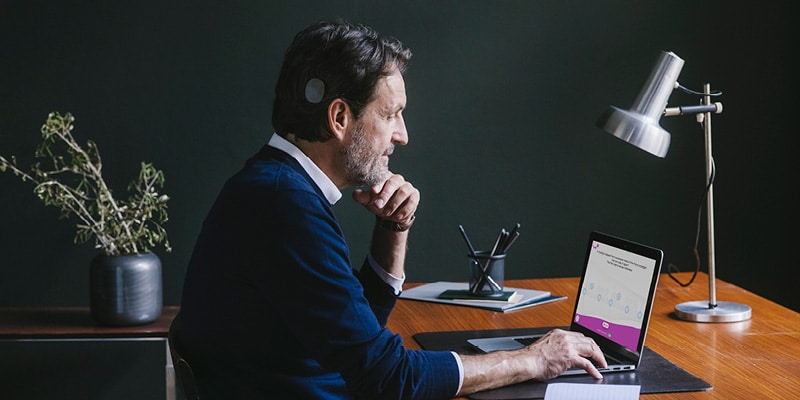MED-EL
Published Dec 27, 2022
The Benefits of Music Therapy and Training for Adult Cochlear Implant Recipients

Music plays a significant role in our social connectiveness and quality of life. While adults typically receive hearing implants to aid spoken communication, music appreciation is also important.
Music Appreciation With Cochlear Implants
A systematic review evaluating music appreciation in adult cochlear implant recipients found that CI recipients participate in and enjoy music.[1] While research continues to improve device-related cochlear implant technology for music perception,[2,3] music training also plays an important role as part of cochlear implant rehabilitation. In addition to advancements in CI technology, recent research indicates that auditory music training can improve recipients’ music perception.[4]
Providing Music Therapy to Hearing Implant Recipients
Mag. Bianca Wirthner, MSc, BSc, Music Therapist from University Hospital St. Pölten recently shared her insights in providing music therapy to hearing implant recipients. Her holistic therapy provision includes both active practice and receptive listening tasks focusing on melody and instrument recognition, directional hearing, and music listening training.
Wirthner found that music therapy improved cochlear implant recipients’ reported music perception, which had successive impacts on self-confidence and quality of life.[6] You can hear more from Bianca Wirthner in this ExpertsONLINE discussion.
Meludia: A Powerful Music Training Tool for Listeners at All Levels
Meludia, an online music training platform, is another way to support music perception and appreciation in the hearing implant recipients you work with. Meludia provides step-by-step music activities to train the brain. Meludia gives hearing implant recipients the opportunity to start music training at home, independently.[5]
The software, created by musicians with experience of hearing loss, is easy to use, motivating, and engaging. Meludia has been shown to support hearing implant recipients to work on individual goals regardless of their age, duration of cochlear implant use, musical background, or present abilities.[5]
Meludia: More Than Improved Music Perception
Meludia aims to improve cochlear implant recipient’s music perception, recognition and discrimination, and in doing so, also develops auditory attention, perception of speech in noisy environments and music enjoyment.
Your patients can try Meludia for free with their myMED-EL account.* And if they don’t have a myMED-EL account yet, it’s free to sign up for one.
For further information about music and practical tips for the adult cochlear implant recipients you work with, download Music Tips for Adults. This material includes information to support hearing implant users to gain better access to music and develop their music appreciation. It includes recommendations about music choice, audio-visual presentation, listening environments, music listening equipment, the playing of instruments, and other music resources.
Music Tips for Adults is available on the MED-EL rehabilitation downloads page. Scroll down to locate the resource and select the language you wish to download. It is available in 12 languages including Spanish, Russian, and Italian.
More on Music Therapy and Training
- The Importance of Music in Cochlear Implant Rehabilitation for Adults
- Musical EARS®: A Free Guide to Aural Rehabilitation With Music
Subscribe and Share
Don’t miss any updates from the MED-EL Professionals Blog. Subscribe now and get the latest articles sent directly to your inbox.
*Offer unavailable in Japan for legal reasons.
References
- Riley, P. E., Ruhl, D. S., Camacho, M., & Tolisano, A. M. (2018). Music appreciation after cochlear implantation in adult patients: a systematic review. Otolaryngology–Head and Neck Surgery, 158(6), 1002-1010. https://doi.org/10.1177/0194599818760559
- Limb, C. J., & Rubinstein, J. T. (2012). Current research on music perception in cochlear implant users. Otolaryngologic Clinics of North America, 45(1), 129-140. https://doi.org/10.1016/j.otc.2011.08.021
- Roy, A. T., Carver, C., Jiradejvong, P., & Limb, C. J. (2015). Musical sound quality in cochlear implant users: a comparison in bass frequency perception between fine structure processing and high-definition continuous interleaved sampling strategies. Ear and hearing, 36(5), 582-590. https://doi.org/10.1097/AUD.0000000000000170
- Ab Shukor, N. F., Lee, J., Seo, Y. J., & Han, W. (2021). Efficacy of music training in hearing aid and cochlear implant users: a systematic review and meta-analysis. Clinical and Experimental Otorhinolaryngology, 14(1), 15-28. https://doi.org/10.21053/ceo.2020.00101
- Boyer, J., & Stohl, J. (2022). MELUDIA–Online music training for cochlear implant users. Cochlear Implants International, 1-13. https://doi.org/10.1080/14670100.2022.2069313
- Magele, A., Wirthner, B., Schoerg, P., Ploder, M., & Sprinzl, G. M. (2022). Improved Music Perception after Music Therapy following Cochlear Implantation in the Elderly Population. Journal of Personalized Medicine, 12(3), 443. https://doi.org/10.3390/jpm12030443
MED-EL
Was this article helpful?
Thanks for your feedback.
Sign up for newsletter below for more.
Thanks for your feedback.
Please leave your message below.
CTA Form Success Message
Send us a message
Field is required
John Doe
Field is required
name@mail.com
Field is required
What do you think?
The content on this website is for general informational purposes only and should not be taken as medical advice. Please contact your doctor or hearing specialist to learn what type of hearing solution is suitable for your specific needs. Not all products, features, or indications shown are approved in all countries.
MED-EL

.png)


